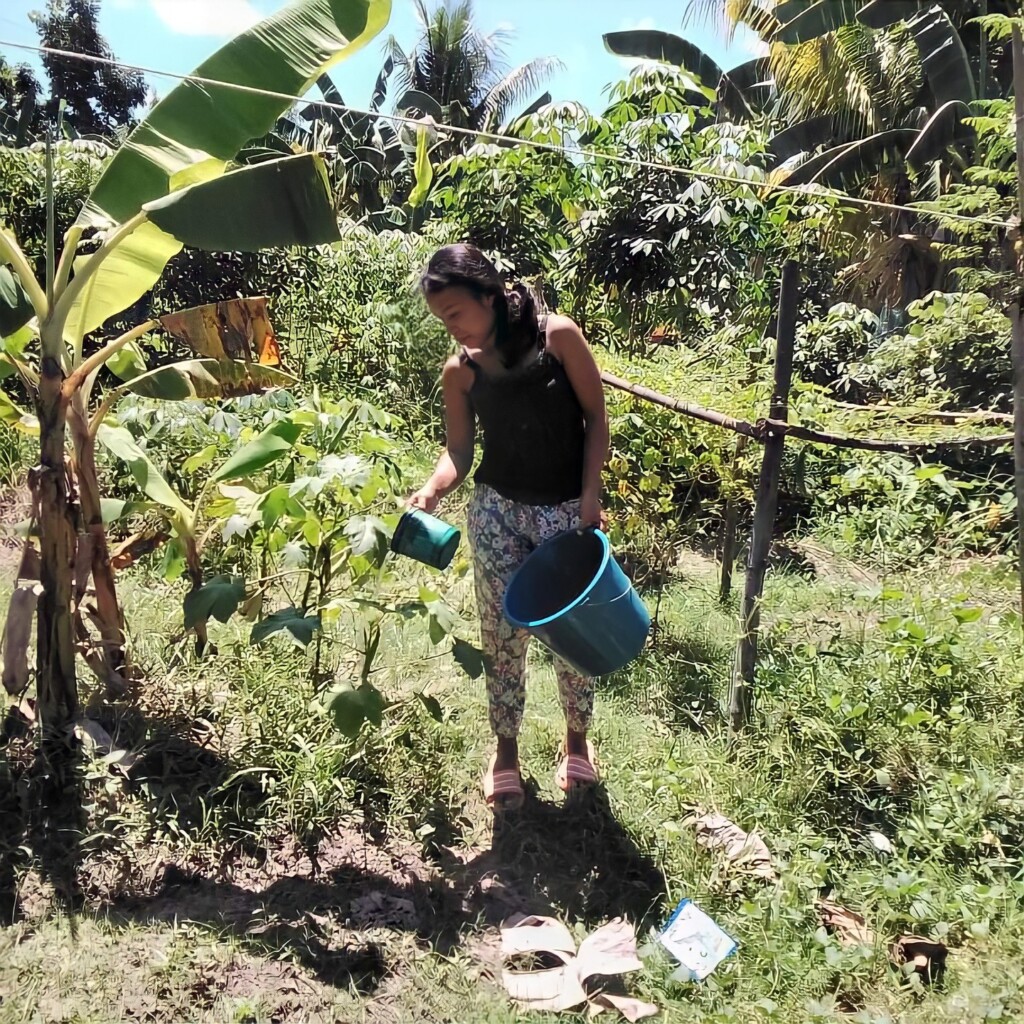News
Nutrition International celebrates BISA project’s milestones in stunting reduction and enhancing health in Indonesia
June 26, 2024
Sowing knowledge and seeds
Mother-to-mother support groups are empowering local solutions in the Philippines.
Posted on February 28, 2022
Every morning, Michelle Pelina checks her garden for weeds, diligently removing anything that would impede steady plant growth. Her two children help her water the bounty that is part of the family’s diet. They’re growing vegetables like kamote (sweet potato), okra (lady finger), talong (eggplant), ampalaya (bitter gourd), malunggay (horseradish), kalabasa (squash) and papaya.
The garden is a new addition to Pelina’s home in Cabilao Pequeño, Philippines. Yet, its quickly become an integral part of the family’s daily life.
Cabilao Pequeño is a barangay (village) that was part of Nutrition International’s Barangay First 1,000-Days (BF1KD) program. The program, implemented by Nutrition International in partnership with Helen Keller International to support the Philippines’ Department of Health, focused on preventing malnutrition in young children by supporting women from the time they get pregnant to their child’s second birthday—a window known as the first 1,000 days of growth.
While pregnant with her second child, Pelina joined the program to participate in the mother-to-mother support groups. Through her group, Pelina learned about breastfeeding best practices and the importance of complementary feeding after six months (introducing quality foods into a child’s diet alongside breastfeeding).
The BF1KD program was devised to empower local solutions. Like others in the area, Pelina’s family relies on the income her husband earns from commercial fishing. With COVID-19 lockdowns and restrictions affecting income-generating activities and supply chains globally, purchasing fresh food at affordable prices became a difficult reality for many families.

Participants from the mother-to-mother support groups were engaged to simultaneously participate in another project already implemented by the Philippines’ Department of Agriculture: household gardens. It was here that Pelina discovered she could grow vegetables and promote her family’s health from the comfort of her very own backyard.
“It’s convenient because we can immediately harvest fruits and vegetables. We can eat them daily,” Pelina shared.
“The immediate result of having a vegetable garden answered the question of food insecurity, especially when the COVID-19 pandemic hit the Philippines. There were long lockdown periods, restrictions of movement, and even job insecurity,” said Angelita Sapitula-Evidente, Nutrition International’s Newborn Care, Infant and Young Child Nutrition’s Senior Program Officer in the Philippines.
The project has shed light on how targeting women as heads of households creates opportunity for sustainable change.
Nutrition International’s Philippines’ Development Communications Coordinator, Mary Jane San Juan, describes traditional household structures in the Philippines as dependent on mothers to manage the home and its functions. They play a major role in food preparation and monitoring their families’ diet.
“A child aged six to 23 months should consume complementary foods from at least four out of the seven food groups to ensure proper nutrition. Having these backyard gardens checks off at least three of these food groups – fruits, vegetables, and legumes – that are rich in nutrients and vitamins,” shared San Juan.
“The seedlings distributed were available for everyone, but not everyone claimed these seedlings. So, the project’s focus was for the BF1KD mothers to be prioritized in the distribution process by ensuring that they were early receivers.”
Nutrition International’s strong relationship with the Philippines’ Department of Health supported the integration of national health and nutrition strategies at the barangay level. This included technical assistance to provinces and municipalities in the process of developing their local nutrition action plan.
During the pandemic, the Philippines Department of Agriculture intensified their seedling distribution program to barangay members. As San Juan explained, “The seedlings distributed were available for everyone, but not everyone claimed these seedlings. So, the project’s focus was for the BF1KD mothers to be prioritized in the distribution process by ensuring that they were early receivers because it assisted with the complementary feeding practices that the BF1KD program advocated for.”
In tandem with the distribution of seedlings, barangay nutrition experts encouraged soon-to-be and new moms in the BF1KD support groups to build and maintain their own backyard gardens. Although the BF1KD project has formally come to a close after four years, the initiative’s integration into municipal nutrition action plans means it will continue to help households sustainably secure more budget-friendly and fresh food options sourced from their own homes.
“Our household can harvest crops in our backyard anytime,” said Pelina.
Nutrition International’s BF1KD program and the backyard gardening project recognized the value of leveraging existing women’s groups within the barangays. The program used this as an entry point to build on the knowledge and skills of women like Michelle Pelina, who have become agents of sustainable change within their families, and subsequently, their communities.
As Pelina’s children learned how to care for their garden and thereby, care for their health, she hopes they can also pass this knowledge along to their children one day.